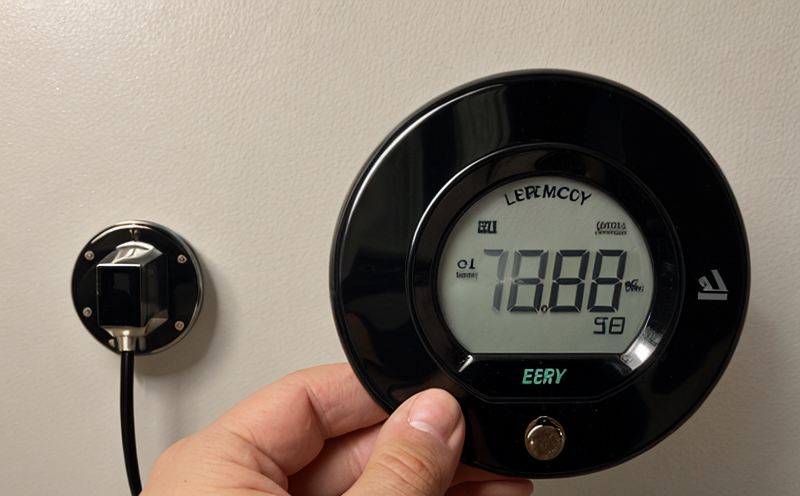EN 14825 Seasonal Energy Efficiency Testing for HVAC Systems
The European Standard EN 14825 provides a comprehensive framework for assessing the seasonal energy efficiency ratio (SEER) of heating, ventilation, and air conditioning (HVAC) systems. This standard is particularly relevant in sectors like residential buildings, commercial real estate, and industrial facilities where HVAC equipment plays a crucial role in maintaining comfort while minimizing energy consumption.
Seasonal Energy Efficiency Testing under EN 14825 involves simulating the operating conditions that an HVAC system encounters during its typical seasonal use. The test measures both cooling performance (SEER) and heating performance (HSPF). This approach ensures a holistic evaluation of the equipment's energy efficiency across varying outdoor air temperatures.
The testing protocol is designed to provide accurate, repeatable results that can be used for compliance with international regulations and industry standards. Compliance officers and quality managers rely on these tests to ensure that HVAC systems meet specified performance levels before installation or during routine maintenance audits. R&D engineers use this data to refine designs and improve the efficiency of future models.
To conduct EN 14825 testing, a controlled environment is created using a climate chamber that simulates realistic outdoor conditions. Specimens are placed in these chambers where they undergo continuous operation under prescribed test procedures. The performance metrics collected include energy input, cooling capacity, and heating capacity. These data points form the basis for calculating SEER and HSPF.
The acceptance criteria defined by EN 14825 ensure that only systems meeting stringent requirements are certified as compliant. This standard sets a benchmark for the industry, promoting innovation in HVAC technology and reducing overall energy costs. By adhering to these guidelines, manufacturers can enhance their products' market competitiveness while also contributing to sustainability goals.
For precise testing, specialized equipment is required, including climate chambers capable of wide temperature ranges and sophisticated data acquisition systems. The precision and reliability of this instrumentation are critical in producing accurate results that reflect real-world usage scenarios. Reporting from these tests typically includes detailed performance metrics along with comparisons against previous models or industry benchmarks.
Understanding the nuances of EN 14825 testing is essential for those involved in HVAC system procurement, design, and compliance management. Familiarity with this standard allows stakeholders to make informed decisions about equipment selection and ensures ongoing adherence to regulatory requirements.
Applied Standards
The primary standard applied in EN 14825 Seasonal Energy Efficiency Testing is the European Standard EN 14825:2019, which specifies the method for determining the seasonal energy efficiency ratio (SEER) and heating seasonal performance factor (HSPF) of air conditioning units. This standard is aligned with international standards such as ASHRAE 110-2017 in the United States and ISO 11158-2:2016 in other parts of the world.
The testing procedure outlined in EN 14825 requires the use of a climate chamber capable of simulating outdoor conditions over an extended period. Specimens are placed within this controlled environment where they operate continuously under specified test conditions. The performance metrics collected during these tests include energy input, cooling capacity, and heating capacity.
Acceptance criteria for compliance with EN 14825 are stringent and ensure that only systems meeting specific standards can be certified as compliant. These criteria include minimum SEER and HSPF values based on the size of the HVAC system and its intended application. Compliance ensures that manufacturers produce high-quality products that meet market demands and regulatory expectations.
By adhering to these rigorous testing procedures, manufacturers can ensure their HVAC systems are reliable, efficient, and cost-effective. This compliance not only enhances product quality but also supports broader sustainability goals by reducing energy consumption in buildings across various sectors.
Industry Applications
The EN 14825 seasonal energy efficiency testing is widely applicable across multiple industries where HVAC systems play a vital role. In residential construction, this test ensures that new homes are equipped with efficient cooling and heating solutions that reduce long-term operational costs. For commercial real estate developers, compliance with EN 14825 helps in meeting green building certification standards such as LEED or BREEAM.
In the industrial sector, manufacturers of HVAC equipment can use this testing to validate their product designs against industry benchmarks. This validation is crucial for maintaining competitive advantage and ensuring that products meet evolving market demands. Educational institutions also benefit from EN 14825 compliance by providing students with accurate data on energy efficiency ratios which aids in research and development efforts.
Furthermore, government agencies responsible for regulating building codes and standards often reference EN 14825 when setting minimum performance requirements for HVAC systems. By incorporating this standard into their regulations, governments support the transition towards more sustainable urban environments and promote public health through improved indoor air quality.
Eurolab Advantages
At Eurolab, we offer unparalleled expertise in conducting EN 14825 Seasonal Energy Efficiency Testing for HVAC systems. With state-of-the-art facilities and a team of highly qualified professionals, we ensure that every test adheres strictly to the requirements outlined by the standard. Our advanced climate chambers simulate real-world operating conditions with precision, providing reliable and repeatable results.
Our commitment to quality extends beyond just meeting regulatory standards; it includes offering comprehensive support throughout the testing process. From initial consultation on specimen preparation to final analysis and reporting, our team works closely with clients to ensure they have all necessary information for informed decision-making. We also provide detailed insights into how compliance impacts product performance and market positioning.
Moreover, Eurolab's focus on innovation allows us to stay at the forefront of technological advancements in HVAC testing. Our continuous investment in cutting-edge equipment ensures that we can accurately assess even the most complex systems. This capability not only enhances the accuracy of our test results but also sets a benchmark for industry best practices.
By choosing Eurolab, clients benefit from our deep understanding of both the technical aspects and broader implications of EN 14825 Seasonal Energy Efficiency Testing. Our rigorous approach guarantees that every system tested meets or exceeds the specified performance levels, thereby contributing to energy savings and environmental sustainability goals.





